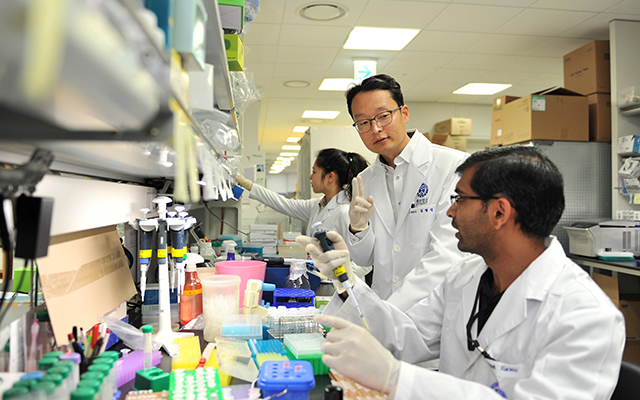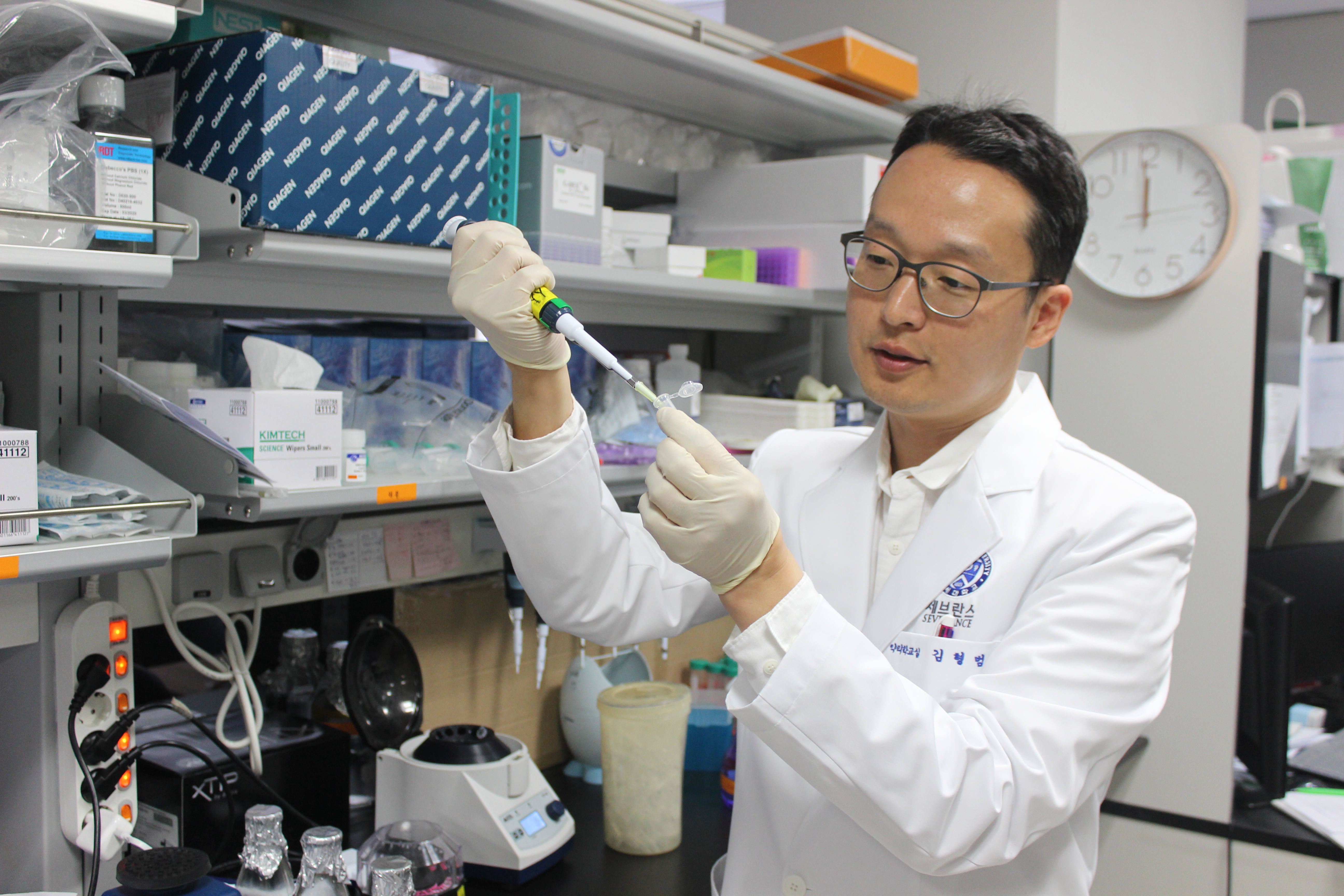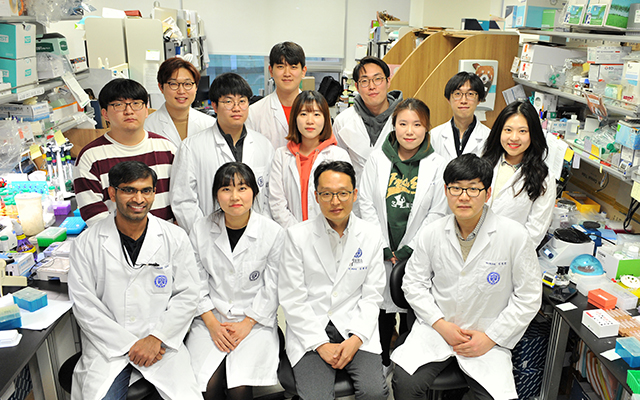Leading the Way in Genetic Science: Interview with STAR researcher Hyung-bum Kim
Humanity's drive to understand the nature of our biology and its mechanisms has brought about phenomenal improvement in technology in the field of genetics. From the mere discovery of the human genes to the analysis and editing of genetic information, researchers have come a long way.
Professor Hyung-bum Kim of the Department of Pharmacology at Yonsei University in Seoul, Korea, has currently made great strides to further advance genetic research. Awarded the STAR (Science Technology And Researcher) of May 2019 by the Ministry of Science and ICT, Professor Kim’s recent research on using deep learning* technology to improve the efficiency of genetic scissor experiments is expected to bring significant changes to genetic science.

Universal genetic scissors are biological tools that enable the cutting and editing of genetic information by using the CRISPR-Cas9 system. This system is a defense mechanism of bacteria against viruses. When bacterium is attacked by a virus, the bacterium stores the virus’s genetic information in the CRISPR. In the face of subsequent attacks, genetic information from the CRISPR in the form of RNA guides the enzyme, Cas9, to attack the virus by cutting a specific segment of the virus’s DNA.
By manipulating the RNA via genetic technology, scientists have evolved this remarkable defense mechanism of bacteria into a universal genetic scissor capable of artificially editing DNA. Scientists are capable of cutting whichever segment of a DNA they desire for various researches and experiments. Kim’s research has proposed a methodology using the deep learning technology that considerably improves the prediction of the efficiency of experiment outcomes using universal genetic scissors. Being a graduate of the Yonsei College of Medicine and a professor in the Department of Pharmacology, The Yonsei Annals investigated his past, present and future as a researcher and an individual.
Annals: Congratulations for being awarded the STAR of May 2019. How do you feel about it?
Kim: For starters, the recent achievement is not mine alone. It was only possible through the joint effort of the research team including Associate Professor Yoon Sung-roh (Department of Data Science, Seoul National University), Kim Hui-kwon (Ph.D. Candidate, Department of Pharmacology, Yonsei University), and Min Seon-woo (Ph.D. Candidate, Department of Electrical and Computer Engineering, Seoul National University). The hard work and dedication of each and every member is something I am immensely grateful for. On behalf of the team, I would like to express my sincere gratitude for the nomination. Especially since we didn’t anticipate the research to evolve into such a significant project when we initially started, the nomination as the STAR by the Ministry of Science and ICT came as a pleasant surprise to the team—we are very grateful for this honor.
Annals: As a Yonsei graduate, what were your university days like?
Kim: I guess I wasn’t an extraordinary student in my university days. Just like most students, I tried to have as much fun as possible. I enjoyed physical activities and was an active member in the school tennis club, and I remember occasionally skipping some classes to play tennis. Freedom was the most important thing to me during my student life. I didn’t like the idea of having a set pathway imposed on me. I always wanted to pursue my own path in life. This might have influenced my decision to pursue the adventurous path of a researcher now.
Annals: After graduating from the College of Medicine, why did you choose to pursue your current field of research?
Kim: The memorable turning point in my life that made me pursue medical research instead of a conventional path to becoming a doctor happened during practical sessions in my junior year of medical school. In experiencing the work of doctors in practical sessions, I came to a realization that doctors are considerably limited in the extent of help they can give to patients. While I used to think that going to a hospital was equivalent to getting cured, what I witnessed in my junior year wasn’t what I expected—the services that hospitals offer might alleviate pain and suffering, but many of the patients were far from being completely cured even as they were discharged from the hospital. In those moments, I realized that research was the path I should pursue if I wanted to offer a cure in an absolute sense rather than temporarily improving someone’s condition. Research was the only fundamental way to achieve my dream of giving patients the cure they truly deserve.

Annals: The research that got you awarded the “STAR of May 2019” was about using deep learning technology to improve the prediction of CRISPR-Cpf1 guide RNA activity. Can you explain your research in more simple terms?
Kim: In simple words, my research aims to predict the efficiency of experiment outcomes involving universal genetic scissors with sharp precision. When a genetic scissor is generated, it can be executed with relative ease. But the efficiency of its function is an entirely different matter.
Not all genetic scissors have the same level of efficiency. Most genetic scissors have an efficiency rate between 20% to 30%, those with over a 50% efficiency rate are considered exemplary. The reason why my team pursued our research was because of previous challenges in verifying the efficiency and effectiveness of the genetic scissors. The whole process took a prolonged period of time to experiment and calculate, sometimes taking as long as a week to verify. Our research aimed to significantly reduce this process of verification by creating a new system that predicts the efficiency of genetic scissors without the need for individual experiments. However, it should be noted that our research is not about improving the efficiency of the genetic scissors, it is about drastically shortening the length of time and money involved to verify the efficiency of genetic scissors generated from lab experiments, shortening the whole process from a week to mere seconds.
 Professor Kim with his lab team
Professor Kim with his lab team
Annals: What kind of changes do you think your recent research can bring to society?
Kim: We foresee that the technology from our research can be extensively used as one of the fundamental techniques used in experiments involving genetic scissors. By drastically reducing the time spent on efficiency evaluation, we expect the progress of ongoing research and projects in genetic scissor technology to accelerate. Be it searches for cures that tackle several genetic disorders previously considered incurable, or genetic modification on plants and animals for quality enhancement, the application of our technology would enable these processes to be evaluated and concluded at a much faster pace.
Annals: Carrying out research involves effort over an extensive period of time. Even then, there is still such a high level of uncertainty that you’ll get the desired outcome. What motivates you to continue your pursuit in the field of research?
Kim: I am not sure about it myself, but I do simply find the process of research to be profoundly interesting. Research is fascinating in a sense that things often don’t go as you anticipated. I think that’s precisely what makes research attractive —it’s not interesting if it can be easily solved. Being in the field of research, I encounter new challenges on a daily basis, and the solutions are usually not as convenient as I first thought it would be. But that’s what motivates my passion in research. It pushes me to continuously strive towards higher grounds.
Annals: What are your ultimate dreams as a researcher as well as an individual?
Kim: I think my personal goals in life are constantly subject to change, but as of now,my ultimate dream is to save at least a single life through my research by the end of my professional career. Even in this era of remarkable technological advancement, there are many genetic disorders that are considered incurable. There are so many casualties to these incurable conditions and it’s a tragedy. If my research can help save even one more innocent life from such a tragedy, or perhaps dramatically improve a person’s quality of life, it would truly be a dream comes true.
*Deep learning: Part of machine learning technology which refers to the practice of using algorithms for data extraction, learning used to offer a solution and or prediction in a particular field of use
Student Reporter Jo Beom-su (jbs0722@yonsei.ac.kr)
[Editor's Note] This article was contributed by Yonsei University's student-led English monthly, The Yonsei Annals.
Recommended Articles
Professor Myeong Min Lee
A QUIRKY twist of fate: understanding epidermis cell differentiation in plants
Professor Jihyun F. Kim
Microbial Mercenaries for Plant Disease Resistance Ungrounded